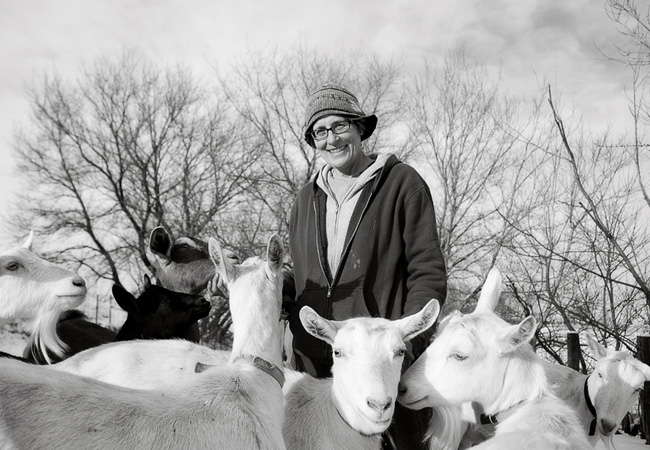
As the goats of Singing Hills Goat Dairy enter the milking shed, Lynne Reeck, co-owner of the farm, encourages them with a gentle, “All right, ladies, let’s go.”
The goats jump up on a low platform. Lynne washes their teats and then places a small milking machine on the first two goats’ teats. The others eat while they wait for their turn, and the kids run around the room snacking on feed in buckets. When there is no more milk, Lynne dips their teats in iodine and the animals leave the room. There are two more groups to be milked after the first.
As the goats stand on the platform, they eat and enthusiastically turn their heads 90 degrees to follow the humans milling around the small space. These ladies (there are currently no bucks on the farm) clearly love people and have quite the personalities. They respond to commands. They sleep as families. They are curious. They also happen to love elderberries, which Lynne sprinkles in their feed.
Singing Hills Goat Dairy is south of the Twin Cities in Nerstrand, MN, a on a 25-acre farm owned by Lynne Reeck and Kathryn Wall. The small operation produces what we think is some of the best fresh goat cheese in the Midwest. Everything is made fresh and it’s evident — the classic chevre is creamy, rich, and gentle all at once. It spreads easily and has a slightly nutty sweetness. We especially love the curry feta, a feta marinated in a homemade curry mix and currants.
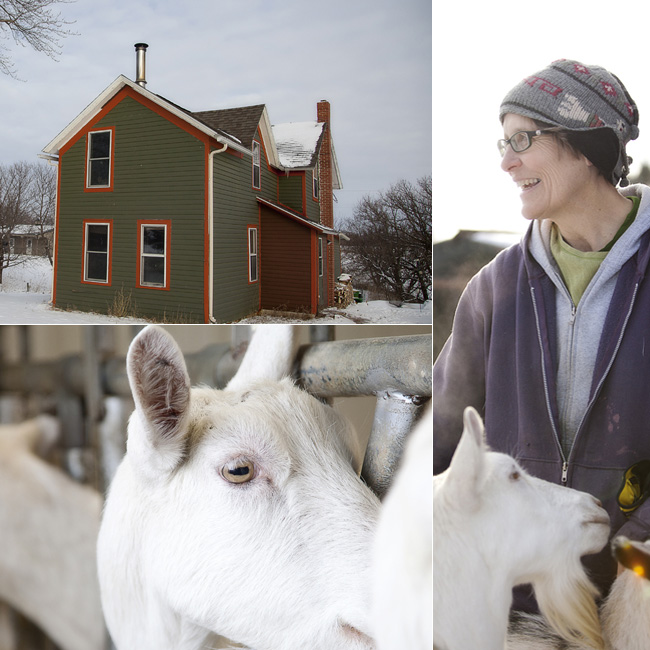
You may recognize Lynne and Kathryn from the Fulton, Kingfield, and Mill City farmers markets. At these markets, and at Just Foods Co-op in Northfield, the owners sell their goat cheese, yogurt, curds, and meat. They make a few versions of chevre: plain, herbed, marinated, and garlic pepper. They also sell plain feta, tomato basil feta, and curried feta.
At the height of summer, Singing Hills milks 100 to 150 gallons of milk. One gallon of milk makes one to two pounds of cheese, depending on the type of cheese. They typically make 150 to 200 pounds of cheese for one weekend at the three farmers markets, and they get additional goat milk from a neighboring farm for cheese making.
The farm is, as its name suggests, hilly, and as picturesque as you’d hope it would be. A cozy farmhouse and red barns dot the landscape. The farm is not certified organic, but they feed the animals organic grain and 90% organic hay. “We don’t use anything on them that we wouldn’t use on us,” Reeck says.
As of now, there are 28 goats on the farm, including Miss Marley, Madonna, and Mandolin, who are related. Professor Higgins, C-Minor, Black-Eyed Susan are some of the others. (The first goats were given all music-related names, the second group characters from musicals. This year they ran a few contests on Facebook to select names.)
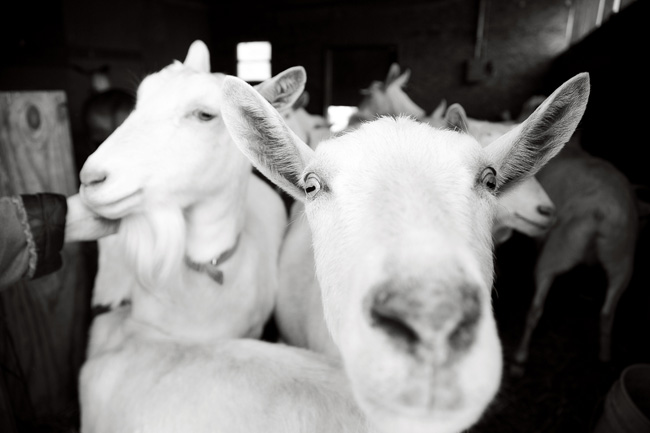
Reeck takes about two hours every day (twice a day in the summer) to feed and milk the goats. As we witnessed, they typically come in and out of the milk parlor willingly, but a couple of scuffles do break out among the kids who snack on feed from buckets. Professor Higgins dares to come back for double dips. Jenna, who is pregnant, probably with triplets, needs some help getting down from the platform on which they milk. And each goat definitely has her own personality. “Miss Marley is real bossy so she’ll put anyone in their place that she feels is getting out of line,” Reeck says. “Black-Eyed Susan is the leader in the pasture, but for some reason is not the most dominant in the barn.”
Cheesemaking is a time-consuming task, and one that the farmers had to learn a lot about since federal and state regulations are strict. Reeck changes her clothes and shoes every time she enters the room. There’s a square-shaped tracking machine on the wall that records the pasteurization of their milk, which the state checks on routinely.
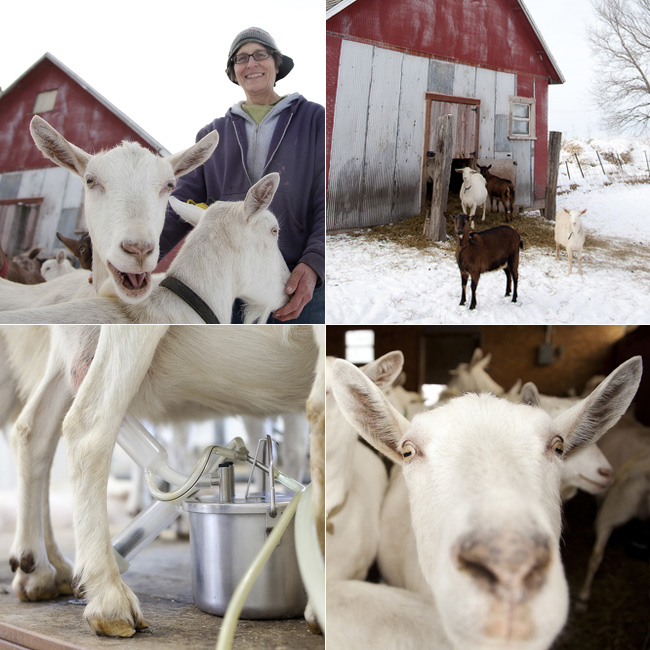
“The reality of cheesemaking,” Reeck says, “is that there’s a lot of routine. You really have to like the work. I wash a lot of stuff. I wash myself, dishes, clothes.”
Reeck and Wall started out as vegetable farmers in 2003, but always had animals, and specifically goats, in the back of their minds. After a couple years, in 2004, the two farmers began to feel that the rolling land and clay-like soil would be better suited for animals. So slowly, with some help, they made the transition to a goat farm with cheesemaking facilities on site, and 2010 was their first official year in the goat business.
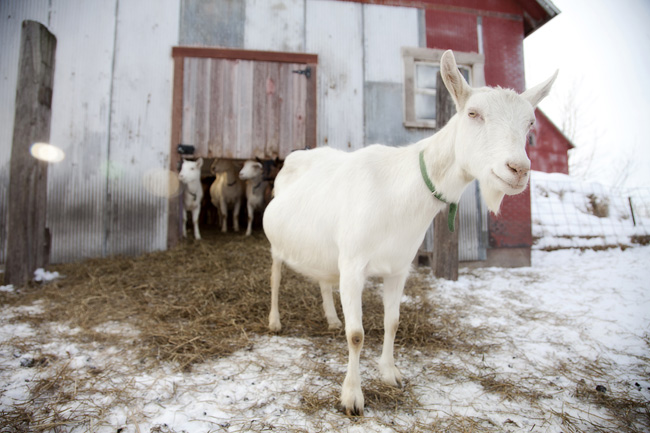
Now, they’ve embraced the chaos that comes with animals. During our visit, two kids broke out in a little battle over a bucket of food. Up on their back legs, the two bumped heads.
Reeck and Wall hope to expand, offering more wholesale options and experimenting with selling milk and butter.
“There’s a lot of good about it but there’s a lot of challenging parts too,” Reeck says. “You really have to like the work. Cheesemaking is a magical process.”
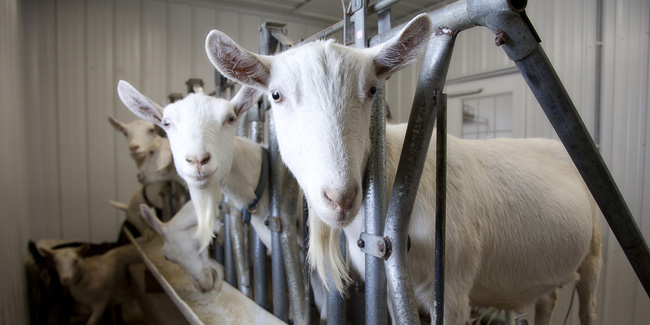

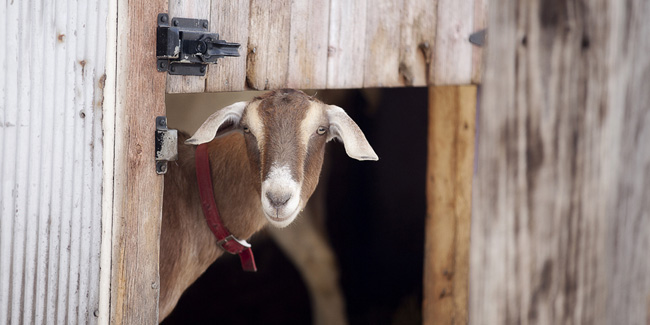
Comments are closed.